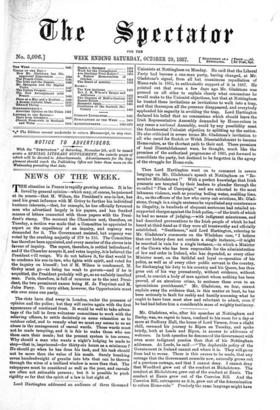Then Lord Hartington went on to comment in severe language
on Mr. Gladstone's speech at Nottingham on " Re- member Mitcheletown !" With a perfect knowledge that Irish peasants are tempted by their leaders to plunder through the so-called "Plan of Campaign," and are exhorted to the most inhuman violence, such as pouring boiling water, scalding lime,
on the officers of the law who carry out evictions, Mr. Glad- stone, though in a single sentence he repudiated any countenance to illegality, in hundreds of eloquent sentences had retailed un- supported charges against the Irish polioe,—of the truth of which he had no means of judging,—with indignant minuteness, and had described provocations to the Irish people of which he had heard at third-hand as if they were all trustworthy and officially established. "Gentlemen," said Lord Hartington, referring to Mr. Gladstone's comments on the Whelehan case, "1 believe that our history does not contain a tangle instance,—it might be searched in vain for a single instance,—in which a Minister of the Crown who has been responsible for the administration of law and order in Ireland, who has depended, as every other Minister must, on the faithful and loyal co.operation of his police, as well as of every other public servant in the country, for discharging his duty to his country and his Queen, has thus gone out of his way prematurely, without evidence, without proof, to convict a body of men against whom nothing has been proved, of an atrocious crime, to sentence them even to an ignominious punishment." Mr. Gladstone, we fear, cannot explain away the evidence that, in this matter at least, he has been seriously in fault for rashly and hastily assuming what he ought to have been most slow and reluctant to admit, even if he had had before him a considerable mass of weighty testimony.


































